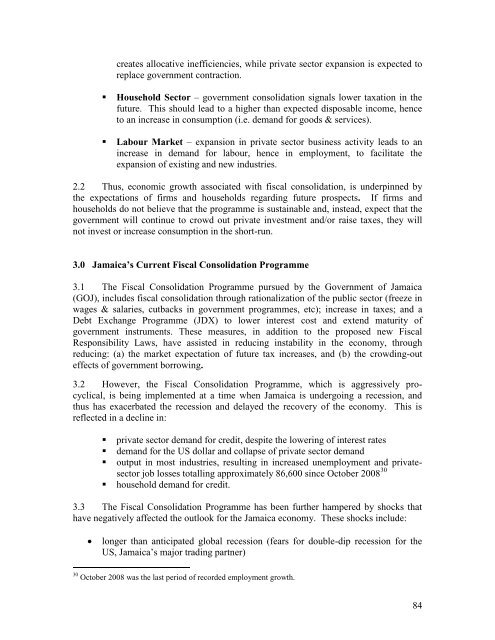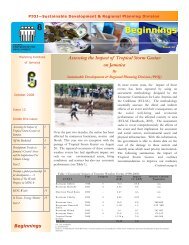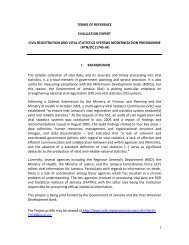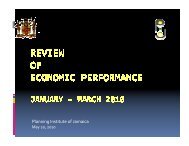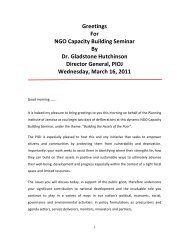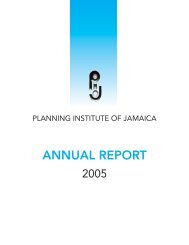PIOJ Growth-Inducement Strategy - Planning Institute of Jamaica
PIOJ Growth-Inducement Strategy - Planning Institute of Jamaica
PIOJ Growth-Inducement Strategy - Planning Institute of Jamaica
Create successful ePaper yourself
Turn your PDF publications into a flip-book with our unique Google optimized e-Paper software.
creates allocative inefficiencies, while private sector expansion is expected to<br />
replace government contraction.<br />
• Household Sector – government consolidation signals lower taxation in the<br />
future. This should lead to a higher than expected disposable income, hence<br />
to an increase in consumption (i.e. demand for goods & services).<br />
• Labour Market – expansion in private sector business activity leads to an<br />
increase in demand for labour, hence in employment, to facilitate the<br />
expansion <strong>of</strong> existing and new industries.<br />
2.2 Thus, economic growth associated with fiscal consolidation, is underpinned by<br />
the expectations <strong>of</strong> firms and households regarding future prospects. If firms and<br />
households do not believe that the programme is sustainable and, instead, expect that the<br />
government will continue to crowd out private investment and/or raise taxes, they will<br />
not invest or increase consumption in the short-run.<br />
3.0 <strong>Jamaica</strong>’s Current Fiscal Consolidation Programme<br />
3.1 The Fiscal Consolidation Programme pursued by the Government <strong>of</strong> <strong>Jamaica</strong><br />
(GOJ), includes fiscal consolidation through rationalization <strong>of</strong> the public sector (freeze in<br />
wages & salaries, cutbacks in government programmes, etc); increase in taxes; and a<br />
Debt Exchange Programme (JDX) to lower interest cost and extend maturity <strong>of</strong><br />
government instruments. These measures, in addition to the proposed new Fiscal<br />
Responsibility Laws, have assisted in reducing instability in the economy, through<br />
reducing: (a) the market expectation <strong>of</strong> future tax increases, and (b) the crowding-out<br />
effects <strong>of</strong> government borrowing.<br />
3.2 However, the Fiscal Consolidation Programme, which is aggressively procyclical,<br />
is being implemented at a time when <strong>Jamaica</strong> is undergoing a recession, and<br />
thus has exacerbated the recession and delayed the recovery <strong>of</strong> the economy. This is<br />
reflected in a decline in:<br />
• private sector demand for credit, despite the lowering <strong>of</strong> interest rates<br />
• demand for the US dollar and collapse <strong>of</strong> private sector demand<br />
• output in most industries, resulting in increased unemployment and privatesector<br />
job losses totalling approximately 86,600 since October 2008 30<br />
• household demand for credit.<br />
3.3 The Fiscal Consolidation Programme has been further hampered by shocks that<br />
have negatively affected the outlook for the <strong>Jamaica</strong> economy. These shocks include:<br />
<br />
longer than anticipated global recession (fears for double-dip recession for the<br />
US, <strong>Jamaica</strong>’s major trading partner)<br />
30 October 2008 was the last period <strong>of</strong> recorded employment growth.<br />
84


